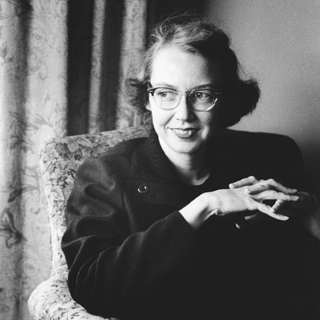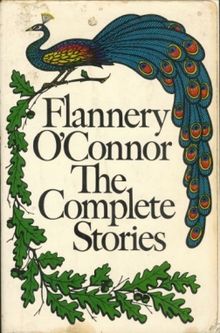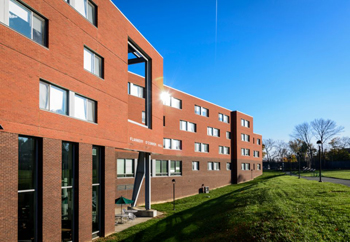Michael Fitzpatrick is a parishioner at St. Mark's Episcopal Church in Palo Alto, CA. After growing up in the rural northwest, he served over five years in the U. S. Army as a Chaplain's Assistant, including two deployments to Iraq. After completing his military service, Michael has done graduate work in literature and philosophy. He is now finishing his PhD at Stanford University.
In an American literary landscape burgeoning with classic male writers like Ernest Hemingway or John Steinbeck, Flannery O’Connor’s stature as a homegrown author from the state of Georgia has been a welcome expansion of the American English canon. Flannery is remarkable for both the poignant Irish-Catholic perspective she brought to her storytelling, and for her battle with lupus, a disease that should have claimed her life more than seven years before it did in 1964 at age thirty-nine. Although it resulted in her untimely death, her courageous ability to overcome her exhaustion to read, write, and offer public readings completes her legacy as an author truly devoted to her craft. Dan Clendenin has featured Flannery here on Journey with Jesus on several occasions, including in a review of her prayer journal, and in a review of Brad Gooch’s critical biography of her.
 |
|
Flannery O'Connor.
|
Recently, PBS produced a 97-minute documentary on Flannery O’Connor as part of its American Masters documentaries (and which features Brad Gooch among its contributors). The film, awarded the Library of Congress Lavine/Ken Burns Prize for Film, is a richly textured and intimate glimpse into the development of a young woman becoming a celebrated artist. Featuring actual readings by Flannery herself, the documentary does well capturing the emphasis in her stories on the human body and its possible disfiguration. An outworking of her own sense of disfigurement from her cortisone treatments for lupus, Flannery presents a corpus of sensitive and unflinching narratives for a nearly forgotten class of people: the disabled, the deformed, the ill—in short, the physically abnormal within social perception. Flannery was unwilling to hide these people from society’s gaze, forcing her readers again and again to contemplate their own arrogant presumptions.
The documentary also provides a fair acknowledgment that Flannery was a mid-20th century Georgia woman embedded deep inside of an ideology of white supremacy and segregation. Beginning with her very first story, Flannery did not shy away from portraying racial dynamics in society. Her first short story, “The Geranium,” is a remarkable tale with absolutely no filter in which Flannery depicts a racist protagonist. Old Dudley is an aging widower with a deeply-ingrained sense of superiority (“Him that had come from a good place”) who spends much of the story disparaging in his heart a black neighbor in the same apartment complex. One day Dudley slips on the stairs after being startled by his neighbor, and to his stunned surprise, his black neighbor not only helps him up the stairs to his apartment, but treats him with what is really the only humane and egalitarian kindness in the tale. From this first narrative, Flannery presents herself as a writer who uses racist language and yet develops narratives that undermine the basic premise of racist ideology.
Angela O’Donnell, who teaches at Fordham University, is one of the foremost Flannery O’Connor scholars. In 2020 she published a book that I recommend called Radical Ambivalence: Race in Flannery O’Connor, which tells the story of how Flannery confronted systemic racism through her writing. O’Donnell’s book reveals a woman who recognized herself as both complicit in and sympathetic to the racist structures that benefited her and subjugated the black community in early 20th-century Georgia. From her first short story onward, Flannery had the courage to publicly represent and interrogate her own prejudice through her writing. Short stories such as “Revelation” become acts of confession and atonement for Flannery, in which she critiques not just racism towards people of color but all bigotry and hatred (even body shaming about ugliness). O’Donnell recounts the decades of scholarship that has been done on O’Connor and her struggle to confront and atone for her own racism. In short, O’Connor lived the difficulty of confronting the system of white supremacy she benefitted from, yet her faith constantly pushed her to reject that system in favor of God’s vision for the world.
 |
|
The Complete Short Stories.
|
Barely two weeks after O’Donnell’s book was released, Paul Elie published a June 2020 essay in the New Yorker denouncing O’Connor as an unapologetic racist who cannot be redeemed. The essay reads much like Jonah’s condemnation of Ninevah, dismissing the value of O’Connor’s honesty and critique towards her own sinful sub-culture. The essay resulted in a student protest at Loyola University in Maryland to have Flannery’s name removed from Flannery O’Connor Hall. As their petition circulated, the petition’s author approached Angela O’Donnell for her endorsement. O’Donnell declined, and pointed to her own scholarship arguing that O’Connor’s ambivalence on race enacts the inner war between her best (anti-racist) self and her worst (racist) self, which is the very war “that all white people who are born into and (mal)formed by a racist culture fight, if they are honest enough to admit it.” O’Donnell argued that we need writers who are transparent about their sins and their need for repentance.
The students were not particularly interested in hearing about leaving room for repentance. By the end of last July, Flannery’s name was banished from the hall. Because like Jonah, once we’ve determined that the judgment fits, we’re not interested in grace and mercy. We humans want to see wrath fall on the oppressor, to see our righteous anger vindicated. Yet all too often the gentle but firm voice of God in Christ is heard to respond, “Take heart, your sins are forgiven.” Might seeing Flannery’s life as one warranting forgiveness rather than wrath be to accept God’s vision of her rather than our own? God’s grace did not cancel Flannery, but led a physically deformed Catholic woman with racism in her blood to perform literary acts of repentance. God doesn’t love Flannery O’Connor less (or more) than the students who had her name removed. God gives generously to those we don’t think deserve it. That was certainly an implication Flannery wanted to give her Southern audience about their attitudes towards black Americans.
 |
|
The residence hall at Loyola University in Baltimore, MD which had Flannery O'Connor's name removed from its eves..
|
The PBS American Master’s documentary on Flannery suggests that in some ways, her writing is almost too honest for contemporary readers to appreciate the subtlety of her satire. She presents the Georgia mind as she found and lived it, yet with a subtext that asked, “Should this be the Georgia mind?” No doubt Flannery never fully resolved that question for herself before her body finally succumbed to the disease that ravaged her for nearly a third of her life. But can we appreciate how she embodied the human struggle we all have in falling short of the people we ought to be? All have sinned and fallen short of God’s glory, but much thanksgiving is due for those who recognize this and wrestle with it.
When I read Flannery’s short story “Revelation,” I see myself in Mrs. Turpin, that “old wart hog” with all her warts so prominent. We’re meant to see ourselves in her astonishingly inclusive chauvinism, for we’re all people who need “even their virtues … burned away” at the Last Judgment. But if Mrs. Turpin is a pessimistic Everyperson, that means Flannery saw herself in that character as much as I do. That’s enough for me to want to keep her name on a dorm hall, and to be grateful for her as a fellow Christian helping me find my way in our human struggle.
Michael Fitzpatrick welcomes comments and questions via m.c.fitzpatrick@outlook.com
Image credits: (1) Brainpickings.org; (2) Wikimedia.org; and (3) National Catholic Reporter.



